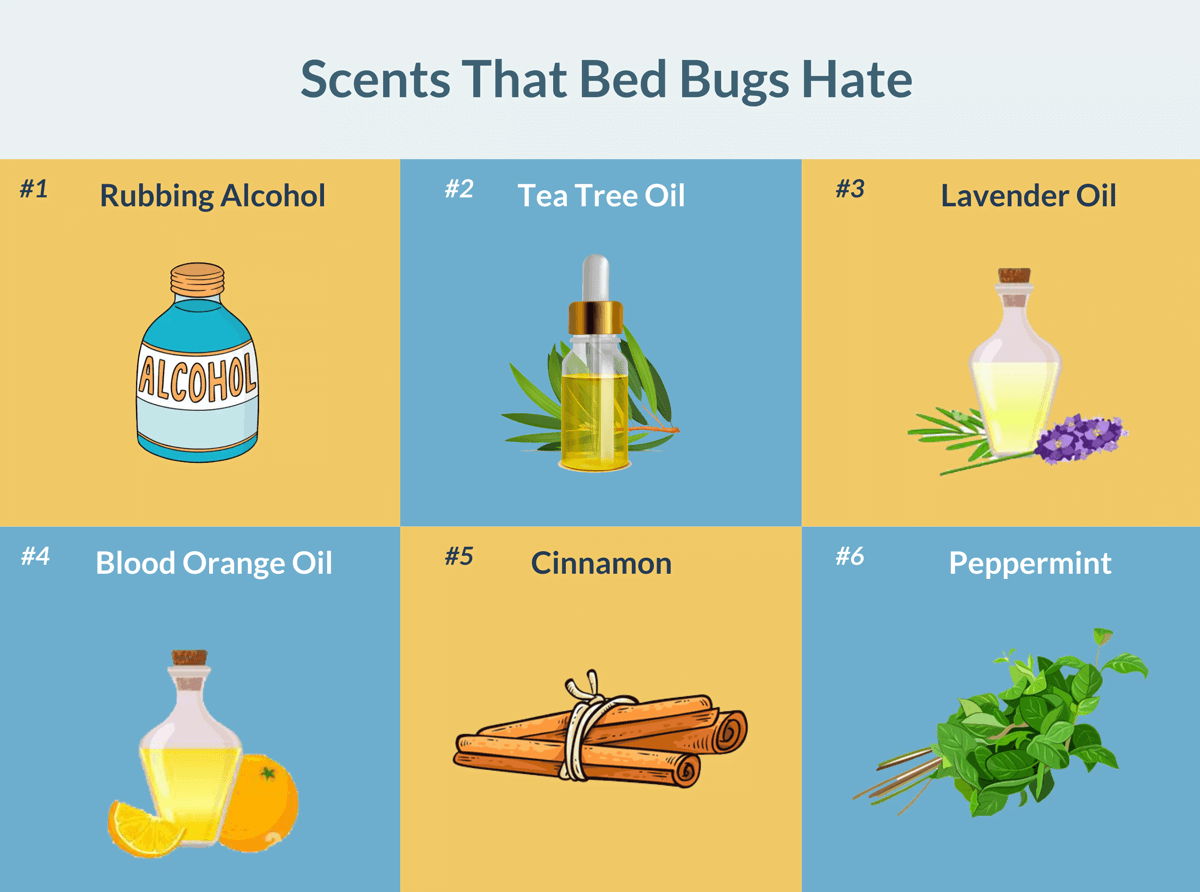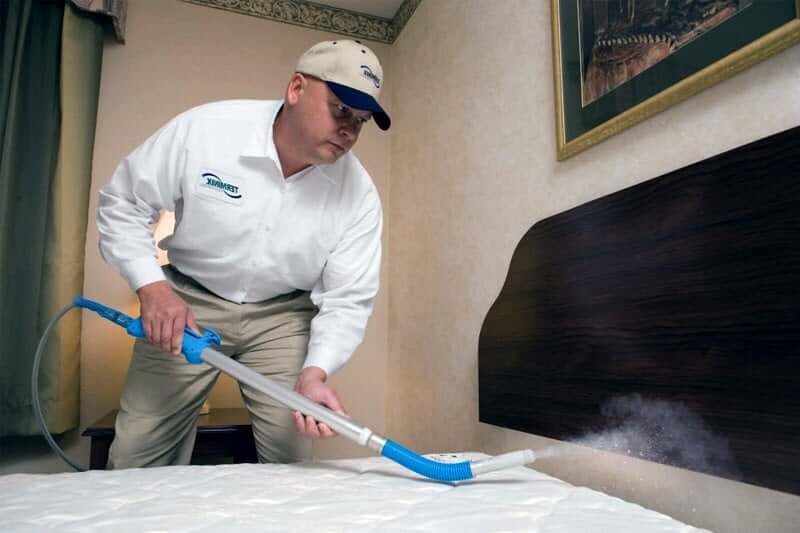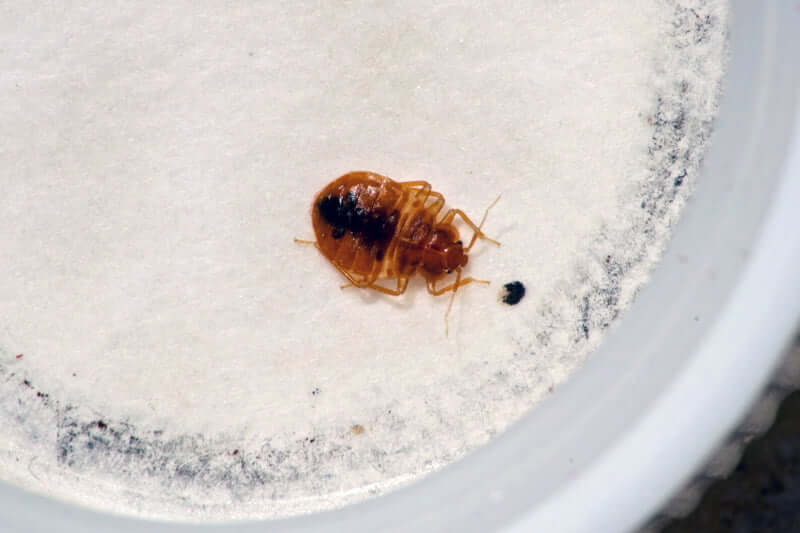Encountering bed bugs, notorious for their nocturnal activities and itchy, sleep-disrupting bites, is an undeniably distressing experience. Habitually concealing themselves in mattresses and bedding to opportunistically feast on blood, these pests have propelled the search for repelling scents as a preventive measure.
Although the pheromones secreted by nymph bed bugs can deter males, it’s noteworthy that essential oils, such as blood orange, paraffin, and spearmint, have showcased only marginal efficacy in repelling these resilient creatures, according to the United States Department of Agriculture.
The most effective scents that repel bed bugs and answer the question of what smell do bed bugs hate include tea tree, powdered pepper, cinnamon, and lavender oils.
See: What kills bed bugs here

Below is an extensive list of common scents you can use that drives bed bugs out of your bead:
- Rubbing alcohol
- Tea tree oil
- Blood orange oil
- Lavender oil
- Powered pepper
- Diatomaceous earth
- Peppermint
- Neem oil
- Lemon
- Cinnamon
#1. Rubbing alcohol
For those wondering about rubbing alcohol bed bugs solutions, it’s worth noting that bed bugs hate the smell of alcohol, and using it is an effective remedy. Rubbing alcohol helps dry out bed bugs’ bodies and leads to their death eventually. This scent will also prevent the pest from laying eggs in your area. The odor that rubbing alcohol releases will deter bed bugs and push them out of your home to look for another place to give birth.
When using alcohol, handle it with care because the alcohol can cause fire hazards.
#2. Tea tree oil
Tea tree oil is a great solution if you don’t want to use alcohol for your bed bug problem. The smell of this essential oil encourages the pest to leave the area immediately after it senses the smell. The essential oil affects their exoskeleton too. When using tea tree oil you will have a good-smelling living space and you will also be free from bed bugs.
#3. Blood orange oil
This essential oil is the answer to your long-term bed bug problems. Blood orange oil is proven to be one of the most effective ways to get rid of bed bugs successfully.
Spray the oil on the surface or put the oil in a diffuser for the scent to be spread around your home to repel the pests and prevent them from coming back. This process takes some time to become effective but will always be worth it.
#4. Lavender oil
Lavender is a widespread plant that you can have in your home as it is known to be an insect repellent. The oil extracted from this plant is used as an essential oil and people love that odor but bed bugs hate it. Spray the oil on the infested areas and the smell will surely drive those nuisances away. Another good thing about lavender oil is it does not only keep bed bugs away but can also help improve your sleep.
#5. Powdered pepper
Good old pepper, a known solution for powdered pepper bed bugs remedies. Our dishes love it but our “bed pets” hate every second of its smell, especially when powdered. A simple sprinkle of powdered pepper will keep your home bed bug-free. The aroma and the active ingredients found in pepper will surely scare those pests away. The best thing is that it can be purchased in every store near you.
#6. Diatomaceous earth
Diatomaceous earth (DE) is an effective solution against all pests. It is actually recommended by many pest experts. Diatomaceous earth is a powder made from fossilized algae. When bed bugs, and all kinds of pests actually, make contact with the DE they get dehydrated and die. By destroying the waxy exoskeleton of the pests, the whole body collapses, and the pest dies. The pungent smell of the powder is what the bed bugs dislike the most. By simply using DE, you are resolving your bed bugs problem gradually.
#7. Peppermint
Peppermint is the most researched solution for keeping bed bugs away from your home. This plant can provide a smell that bed bugs, and other pests in general, hate. It will drive the pests out and keep your home fresh at the same time. Leaves of the plant can be used for this purpose, but it is easier if you spray the peppermint oil around your house. If you do this on a regular basis it will help to eliminate bed bugs and prevent them from coming back.
#8. Neem oil
Neem oil, a form of natural pest control, can be used for keeping bed bugs away as well. According to many pest technicians in professional pest exterminator companies, neem oil is a natural insect repellent. Its smell will make pests leave the place as soon as possible, and it will keep mosquitoes away too.
#9. Lemon
In general, all citrus smells will keep bed bugs away, but the smell of the lemon is death. Some bed bugs cannot resist the smell of lemon juice, and having it around will help you eliminate the problem once and for all. Use fresh lemon juice to kill bed bugs because it has harsh properties that are bad for pests.
#10. Cinnamon
Aside from the above, the smell of cinnamon is an enemy of bed bugs. The smell can keep bed bugs away as they cannot handle it. Spread the powder onto your bed to get rid of bed bugs and prevent them from returning. Some products contain cinnamon powder as an ingredient that can be used against bed bugs.
There is one compound that is common for every solution listed above, linalool. Linalool is the main reason why bed bugs hate all of this scent.
If none of the above options work or don’t complete the task effectively, seek professional help as soon as possible.
FAQ's
Heat treatment is a method usually used by pest control companies to get rid of bed bugs. This treatment works by destroying the cells of the bed bugs, causing them to stop functioning. This is due to the fact that once cells reach a temperature of about 113 degrees it breaks down the bug’s actual DNA.

If you don’t know it exists, you can’t get rid of a bed bug infestation. There are a few common places where you can find bed bugs:
- Furniture: When checking furniture for bed bugs, pay attention to the seams of chairs and couches, around cushioned areas, and in the folds of furniture.
- In drawers: The joints of drawers, which are where the two sides meet and form a corner, should also be checked. If there are interlocking components of the drawers, check these areas for bed bugs, as well.
- Appliances and outlets: Fully examine electrical outlets to ensure there are no bed bugs inside the outlet, or around its cover.
- Around walls: There are certain areas in walls where bed bugs like to live. These include around the wallpaper, particularly if it is loose, wall hangings, and where the floor and ceiling meet.
Even though bed bugs are nocturnal and they don’t particularly like light, they still need to eat. Keeping lights on will not stop bed bugs from coming out from inside the mattress or bed and biting you.
Many pests feed on blood and don’t care where the meal comes from. These pests will attack humans and their pets without showing a real preference. The good news is that even if they bite a cat or dog that’s sitting on a chair or lying on the floor, they will not attach to them.
As we already know, bed bugs are extremely difficult to get rid of. When bed bugs have just eaten, or are larger by nature, they may not be able to float as well. Once they are submerged in water, they will not be able to resurface. A bed bug’s egg can survive in water for as long as 24 hours.




